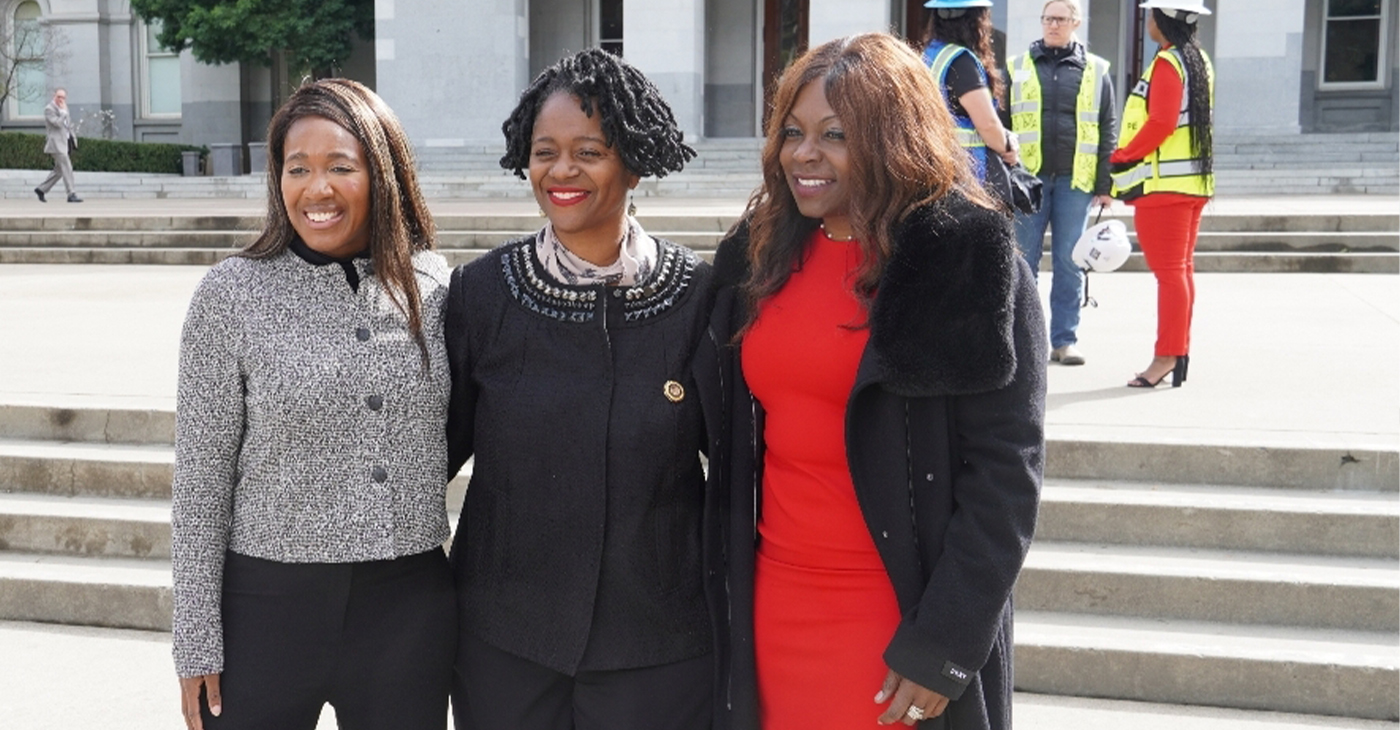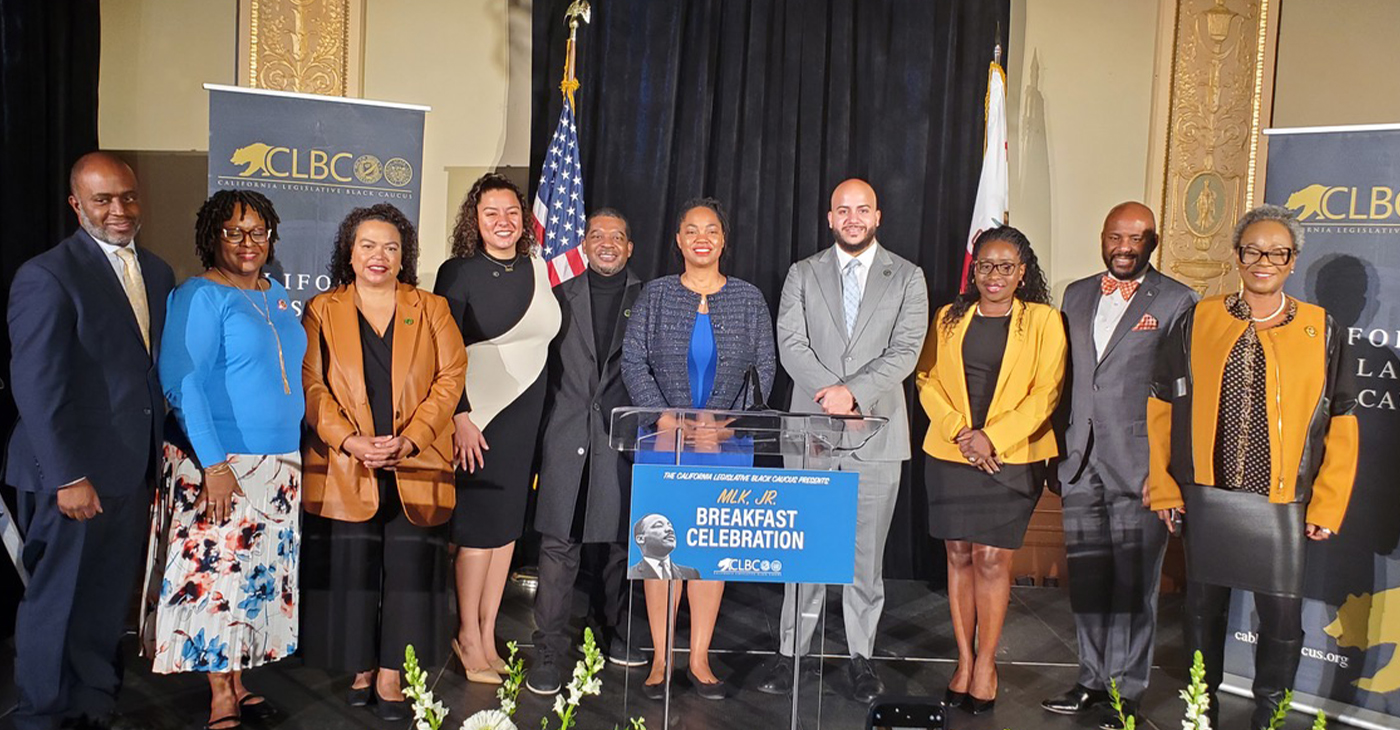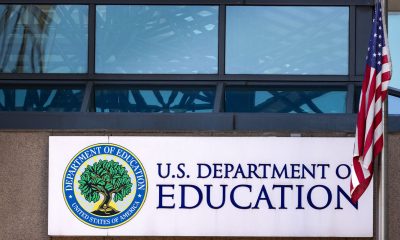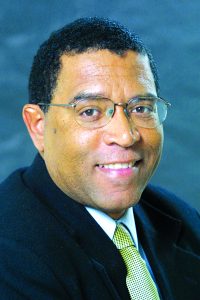Antonio Ray Harvey
Black Women Win State Primaries, Secure Spots on November Ballot
“The June 7 primary election was another demonstration of the consistency of Black Women in the political process,” said Kellie Todd, founding convener of the Black Women’s Collective (BWC), an organization of Black women leaders and advocates working in politics, business, entertainment, health care and other professions across the state.

By Antonio Ray Harvey, California Black Media
Black women running for political office on every level across the state of California showed up strong during the state’s June 7 primary election. They won the minds and the hearts of diverse groups of Californians and drew the numbers they needed to secure spots on the November general election ballot.
The results, some political organizers say, signal that Black women are fully engaged in California’s political process, and they are primed to succeed against stiff competition ahead.
“The June 7 primary election was another demonstration of the consistency of Black Women in the political process,” said Kellie Todd, founding convener of the Black Women’s Collective (BWC), an organization of Black women leaders and advocates working in politics, business, entertainment, health care and other professions across the state.
“And this time we didn’t just show up to cast our votes, we were on the ballot at every level, in diverse communities throughout that state,” Griffin pointed out.
Black Californians represented 26.9% of all candidates on the June 7 primary ballots running for U.S. House seats, a significant showing in a state where there are 2.6 million African Americans out of a total state population of 39.5 million.
In the Bay Area, U.S. Congresswoman Barbara Lee (D-CA-13) has secured a comfortable lead in her reelection bid. She is ahead with 73,038 votes (86.3%) to Republican challenger Stephen Slauson’s 5,272 (6.2%). Lee and Slauson are likely to move on to the general election.
In another state race involving a Black woman, Contra Costa District Attorney Diana Becton declared victory in the race for the county’s chief law enforcement officer.
Becton is currently winning her reelection campaign with a substantial lead of 56.2% (93, 909 votes) to her challenger Mary Knox’s 43.7% (73,100 votes). Knox is a prosecutor who works in her office.
Becton took office as District Attorney in 2017, the first woman and first African American to hold the position in the County’s 167-year history. Becton is currently the only African American district attorney in California.
Becton thanked Knox for her years of service and emphasized the need to keep fighting for smart reforms that make all Californians safer.
“The status quo has decimated entire communities, separated families, and relegated generations of Black and Brown communities as second-class citizens,” Becton said in a June 8 statement. “That is why we will continue working to reduce racial disparities in our systems. We also must continue to hold anyone who harms our communities accountable – even if they are in elected office or wear a badge – because that is what real safety demands.”
After 168,338 mail-in ballots were counted after June 7, U.S. Rep. Karen Bass (D-CA-37) closed the gap against her better-funded, billionaire opponent Rick Caruso in the Los Angeles mayor’s race, according to results released June 10 by the Los Angeles County Registrar-Recorder/County Clerk.
Caruso leads with 155,929 votes (40.5%) to Bass’s 149,104 (38.8%), according to the Clerk’s office. More than 500,000 votes remain uncounted, and ballots postmarked by Election Day will be accepted through June 14.
In statewide races, California Secretary of State Shirley Weber has 2,631,686 votes (59.2%) so far. She will face Republican Rob Bernosky in the general election in November. As of June 12, Bernosky is currently in a distant second place behind Weber with 848,373 votes (19.1%).
Malia Cohen, a current member of the State Board of Equalization, has won 21.3% of votes (973,549) in the race for State Controller, enough to land her in second place and secure a place on the ballot in November.
Cohen will face Lanhee Chen, the only Republican in a six-person race to replace California Controller Betty Yee. Chen leads the race in the primary election with 38.8% of counted votes (1,534,620).
For the 37th Congressional District seat, currently held by Bass, former Los Angeles City Councilmember Jan Perry came in second place with 10,520 votes (18.6%). State Sen. Sydney Kamlager (D-Los Angeles) led the field of seven candidates with 24,354 (43.0%), according to election results released by the Secretary of State’s office on June 11.
Republican Ronda Kennedy, a civil rights attorney running to represent the 30th Congressional District (Burbank), is currently in third place (9,290) behind Democrat G “Maebe A. Girl” Pudlo (10,153). Either Kennedy or Pudlo will face leader Adam Schiff (D-San Diego) in November, Schiff has a commanding lead with 60,658 votes, according to the SOS office.
In the race to represent the 43rd Congressional District, longtime incumbent Maxine Waters (D-Los Angeles) leads Republican Omar Navarro by a wide margin of 33,801 votes to 5,949.
Black Republican Tamika Hamilton could face incumbent Ami Bera (D-Elk Grove) for the District 6 congressional seat in Sacramento and Yolo counties.
Two months after winning the special election for the 11th District Assembly seat, Lori Wilson (D-Suisun City) came out ahead in the primary with 64.9% (48,657 votes). She leads Independent challenger Jenny Lailani Callison, who has 35.1% of votes counted so far (26,349).
“We proved that Black women candidates can be competitive and can also win even without large financial backing from special interests,” Todd said. “This is just the beginning as we continue to build our political power and ensure we have a strong cohort of elected officials ready to serve.”
In State Assembly races, Assemblymember Akilah Weber (D-San Diego) is positioned to retain her seat representing the 79th District with 63.9% (30,005 votes). In the 18th Assembly District in Oakland, Assemblymember Mia Bonta, the only candidate on the ballot, won 100 % of the vote (36,226).
In the State Senate race for the 28th District, two Black women are leading in the primary to succeed Sen. Sydney Kamlager (D-Los Angeles). With 40.9% of the vote (33,687 votes), Lola Smallwood-Cuevas (D) is ahead of Cheryl C. Turner (D), who is in second place with 31.0% (25,508 Votes).
Activism
Sen. Lola Smallwood-Cuevas Honors California Women in Construction with State Proclamation, Policy Ideas
“Women play an important role in building our communities, yet they remain vastly underrepresented in the construction industry,” Smallwood-Cuevas stated. “This resolution not only recognizes their incredible contributions but also the need to break barriers — like gender discrimination.

By Antonio Ray Harvey, California Black Media
To honor Women in Construction Week, Sen. Lola Smallwood-Cuevas (D-Los Angeles), a member of the California Legislative Black Caucus (CLBC), introduced Senate Concurrent Resolution (SCR) 30 in the State Legislature on March 6. This resolution pays tribute to women and highlights their contributions to the building industry.
The measure designates March 2, 2025, to March 8, 2025, as Women in Construction Week in California. It passed 34-0 on the Senate floor.
“Women play an important role in building our communities, yet they remain vastly underrepresented in the construction industry,” Smallwood-Cuevas stated. “This resolution not only recognizes their incredible contributions but also the need to break barriers — like gender discrimination.
Authored by Assemblymember Liz Ortega (D-San Leandro), another bill, Assembly Concurrent Resolution (ACR) 28, also recognized women in the construction industry.
The resolution advanced out of the Assembly Committee on Rules with a 10-0 vote.
The weeklong event coincides with the National Association of Women In Construction (NAWIC) celebration that started in 1998 and has grown and expanded every year since.
The same week in front of the State Capitol, Smallwood, Lt. Gov. Eleni Kounalakis, Assemblymember Josh Hoover (R-Folsom), and Assemblymember Maggie Krell (D-Sacramento), attended a brunch organized by a local chapter of NAWIC.
Two of the guest speakers were Dr. Giovanna Brasfield, CEO of Los Angeles-based Brasfield and Associates, and Jennifer Todd, President and Founder of LMS General Contractors.
Todd is the youngest Black woman to receive a California’s Contractors State License Board (A) General Engineering license. An advocate for women of different backgrounds, Todd she said she has been a woman in construction for the last 16 years despite going through some trying times.
A graduate of Arizona State University’s’ Sandra Day O’Connor College of Law, in 2009 Todd created an apprenticeship training program, A Greener Tomorrow, designed toward the advancement of unemployed and underemployed people of color.
“I always say, ‘I love an industry that doesn’t love me back,’” Todd said. “Being young, female and minority, I am often in spaces where people don’t look like me, they don’t reflect my values, they don’t reflect my experiences, and I so persevere in spite of it all.”
According to the U.S. Bureau of Labor Statistics, only 11.2% of the construction workforce across the country are female. Overall, 87.3% of the female construction workers are White, 35.1% are Latinas, 2.1% are Asians, and 6.5% are Black women, the report reveals.
The National Association of Home Builders reported that as of 2022, the states with the largest number of women working in construction were Texas (137,000), California (135,000) and Florida (119,000). The three states alone represent 30% of all women employed in the industry.
Sen. Susan Rubio (D-Baldwin Park) and the California Legislative Women’s Caucus supported Smallwood-Cuevas’ SCR 30 and requested that more energy be poured into bringing awareness to the severe gender gap in the construction field.
“The construction trade are a proven path to a solid career. and we have an ongoing shortage, and this is a time for us to do better breaking down the barriers to help the people get into this sector,” Rubio said.
Activism
Comparing Histories: Black and Japanese American Advocates Talk Reparations and Justice
Los Angeles-based clinical psychologist Dr. Cheryl Grills and Bay Area-based attorney Don Tamaki, who were part of the nine-member reparations panel, spoke at the “Justice Through Action: Black Reparations-Reparative Justice” event hosted by local chapters of the Japanese American Citizens League (JACL) in Sacramento on Feb. 8.

By Antonio Ray Harvey, California Black Media
Two former members of the California Task Force to Study and Develop Reparation Proposals for African Americans shared some of their experiences developing a 1,075-page report that detailed injustices suffered by African Americans during and after chattel slavery.
Los Angeles-based clinical psychologist Dr. Cheryl Grills and Bay Area-based attorney Don Tamaki, who were part of the nine-member reparations panel, spoke at the “Justice Through Action: Black Reparations-Reparative Justice” event hosted by local chapters of the Japanese American Citizens League (JACL) in Sacramento on Feb. 8.
The event was held at the California Museum.
“The first impact that the overall report had on me is that it gave me a panoramic view and it was a panoramic view of the elephant in the room,” Grills, who attended the event virtually, told the audience.
Grills said the report the task force compiled presented an undiluted version of the Black experience in America/
“You could see the totality of the elephant,” she said. “The report gives you the fullness and density of the elephant, which was, at the same time, validating, overwhelming, and painful.”
The JACL is the nation’s oldest and largest Asian American-Pacific Islander Civil Rights Organization.
The JACL presentation was hosted to observe the 83rd anniversary of Executive Order 9066, which led to the incarceration of 120,000 Japanese Americans during World War II.
That panel was part of the Northern California Time of Remembrance (NCTOR) committee’s Annual Day of Remembrance program organized in partnership with the California Museum.
Tamaki, who is Japanese American and the only non-Black member of the task force, said the Black and Japanese experiences in America have some parallels but there are significant differences as well.
“When you look at reparations, and this was the eye opener to me, it’s actually a unifying concept,” Tamaki said. “There’s no equivalence between four years in a concentration camp that our community experienced and 400 years of oppression.”
Tamaki explained, “We do have some things in common. Japanese know something about mass incarceration and profiling and the consequences. In that respect, there is a reason for all of us, whatever our background, to start looking at (reparations). We have to cure the body and not just put a band-aid on it.”
Grills is a clinical psychologist whose work focuses on community psychology. A Professor of Psychology at Loyola Marymount University, she us also a past president of the Association of Black Psychologists.
Tamaki is a senior counsel at Minami Tamaki LLP. He has spent decades working with AAPI legal services programs. In the 1980s, he participated in the Japanese American reparations movement and served on the pro bono legal team that reopened the landmark 1944 Supreme Court case of Fred Korematsu.
The case resulted in overturning Korematsu’s criminal conviction for violating the incarceration order that led to the imprisonment of 125,000 Japanese Americans after the attack on Pearl Harbor.
Earnest Uwazie, a Sacramento State University criminal justice professor and director of the Center for African Peace and Conflict Resolution, was one of more than 100 persons who listened to the two-hour discussion.
“It’s always great to hear from the people involved in the study of reparations and it is good to get a comparative with the Japanese experience,” said Uwazie. “This was extremely informative.”
Activism
Conscious Reflection: Black Caucus Observes MLK Day Amid California Firestorms
Vice-chair of the CLBC Assemblymember Issac Bryan (D-Ladera Heights) shared with the diverse crowd attending the breakfast that he and Chair, Sen. Akilah Weber-Pierson (D-La Mesa), received numerous messages inquiring whether the event would be called off because of the fires.

By Antonio Ray Harvey, California Black Media
Amid the damage and despair caused by firestorms in the Los Angeles area, the California Legislative Black Caucus (CLBC) held its annual Dr. Martin Luther King, Jr. Breakfast in Sacramento on his birthday, Jan. 15.
All 12 members of the CLBC attended the event, including six Black lawmakers from the Los Angeles region who expressed their deep concerns about constituents displaced or impacted by the fires.
Vice-chair of the CLBC Assemblymember Issac Bryan (D-Ladera Heights) shared with the diverse crowd attending the breakfast that he and Chair, Sen. Akilah Weber-Pierson (D-La Mesa), received numerous messages inquiring whether the event would be called off because of the fires.
Bryan said it was important to move forward with the celebration considering the disaster’s aftermath and the transfer of presidential transition happening in Washington on Jan. 20.
“Hell no, we are not canceling the breakfast,” Bryan said he told callers. “We need to think about the legacy and impact of Martin Luther King, Jr., more than ever. In fact, he would be ashamed if we canceled this breakfast a week before (Donald) Trump takes office.”
The event was held at the Elk’s Tower three blocks north of the State Capitol under the theme, “Black Power, Progress, and Purpose.” Martin Luther King would have turned 96 on the day of the event.
It marked the first time that all CLBC members were in the same room since the 2025-2026 legislative session began in December.
The CLBC holds the event each year to honor the legacy of Dr. King and the celebrate the Caucus’ commitment to service in Black communities across the state.
Speakers included California Secretary of State Shirley Weber and Attorney General Rob Bonta.
Black California constitutional officers — State Controller Malia Cohen and State Superintendent of Public Instruction Tony Thurmond — also attended the event.
“This annual gathering is not only a time for reflections but also a time for renewal (and) a moment to recommit to the values that Dr. King fought and gave his life for,” Weber-Pierson said during her remarks.
The keynote speaker was Lurie Daniel-Favors, who serves as Executive Director at the Center for Law and Social Justice (CLSJ) at Medgar Evers College in New York. The CLSJ is a community-based legal organization that specializes in addressing racial injustice.
“We are in a time and place where the whole world has shifted and the Supreme Court has stepped in and we are returning to what I like to call the ‘Jim Crow’ era of jurisprudence when it comes to Civil Rights, social justice, and advancing equity for the nation,” Daniel-Favors added.
The breakfast celebration featured a drum dance performance by David Bowman and Company, the singing of the Black National Anthem “Lift Ev’ry Voice and Sing” by Olevia Wilson, and additional musical selections by Huie Lovelady and a community choir.
“Many don’t realize the fact that the (CLBC) caucus was the first ethnic caucus in the nation. Eventually, other caucuses were formed,” Secretary of State Weber reminded the guests. “We are proud of the fact that this caucus has been in existence for over 55 years and has served and served well during the hard times in between.”
-

 Activism4 weeks ago
Activism4 weeks agoOakland Post Endorses Barbara Lee
-

 Activism3 weeks ago
Activism3 weeks agoOakland Post: Week of April 2 – 8, 2025
-

 #NNPA BlackPress3 weeks ago
#NNPA BlackPress3 weeks agoTrump Profits, Black America Pays the Price
-

 Activism2 weeks ago
Activism2 weeks agoOakland Post: Week of April 9 – 15, 2025
-

 #NNPA BlackPress3 weeks ago
#NNPA BlackPress3 weeks agoHarriet Tubman Scrubbed; DEI Dismantled
-

 #NNPA BlackPress3 weeks ago
#NNPA BlackPress3 weeks agoTrump Targets a Slavery Removal from the National Museum of African-American History and Culture
-

 #NNPA BlackPress3 weeks ago
#NNPA BlackPress3 weeks agoLawmakers Greenlight Reparations Study for Descendants of Enslaved Marylanders
-

 #NNPA BlackPress3 weeks ago
#NNPA BlackPress3 weeks agoNew York Stands Firm Against Trump Administration’s Order to Abandon Diversity in Schools





















































